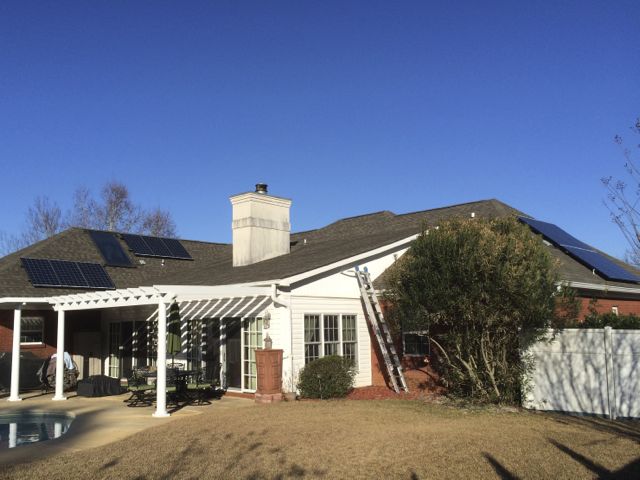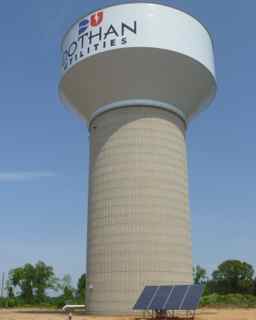Alabama Energy Doctors offers backup and emergency solar energy systems for homes and businesses throughout the Dothan, Alabama region, including parts of Florida and Georgia. If you're interested in a renewable energy system that will provide power for your home or business even in the case of emergency, we've got you covered.

Contact us today for an estimate, or if you're simply curious to learn more about how a backup solar energy system can help protect your home or building from the risk of power outages and natural disasters.

Solar electricity with battery backup we installed at a Dothan water tower.
How do you plan to cook if the utility grid goes down?
While most power outages are caused by storms or utility company mistakes, a growing number of these outages are being blamed on everything from our deteriorating electrical infrastructure & EMPs to terrorists & hackers.
Thousands of families who lost power in recent storms have solar ovens and they are baking the roasts that are quickly thawing in their powerless freezers, along with other perishable foods before they spoil. They are cooking, baking and pasteurizing water, to make it drinkable, while their neighbors sit and wait for the utility trucks to arrive.
How do you plan to run your refrigerator, or radio, or well if the utility grid goes down? Hundreds of families who lost power in recent storms have small or larger solar electric systems with batteries and they have power for their freezers, lights along with well water and maybe a small air conditioner.
https://www.cleanegroup.org/health-care-at-home-the-new-risks-from-a-growing-trend/
Sumary:
For those dependent on electricity for in-home medical equipment, even a short-term outage can be potentially fatal.
Health care complications, including outage related issues like medical device failure, accounted for almost one-third of the estimated 4,645 additional deaths in the three months following Hurricane Maria. The elderly are hit especially hard. The Centers for Disease Control and Prevention published mortality data after Hurricane Irma and found that more than 15 percent of deaths were attributed to an exacerbated existing medical condition caused by a power outage, and an additional 2 percent were associated to a disruption in medical services. The average age of all victims was 63. During the 2003 North American blackout, a single Manhattan emergency department reported 23 patients with issues related to medical device failure due to power loss. The average age of the patients was 67.
When electricity-dependent individuals who rely on medical devices are forced to seek emergency assistance during a power outage, it’s typically at a hospital or medical clinic. After disasters, hospitals are inundated with people in search of power for critical medical equipment, such as oxygen concentrators. A 2003 blackout study published in the Critical Care Medicine journal found that respiratory device failure accounted for 65 emergency department visits and 37 hospitalizations over the two-day period. Residents evacuated to shelters face similar issues. Of the 1,400 people that checked-in to emergency shelters during 2008’s Hurricane Gustav, 20 to 40 percent relied on electricity-dependent medical equipment.
Those who can shelter at home through an outage typically rely on gas generators. Gas generators require refueling, emit pollutants, are prone to failure, and can lead to sickness or death when used improperly. Carbon monoxide poisoning killed nine people after Hurricane Sandy and thirteen people after Hurricane Ike. Gas generators can also be difficult to operate, especially if an individual is mobility impaired and home alone. Battery storage is a safe and reliable alternative that, when combined with solar PV, can provide a potentially unlimited power supply. Battery storage also requires minimal maintenance and can be installed to automatically switch on when the grid goes down. The benefits of resilient power over gas generators has never been more apparent than in Puerto Rico post Hurricane Maria.
After Hurricane Maria, a team from the University of Washington travelled to Puerto Rico to research the potential for solar+storage to support the critical medical needs of electricity-dependent households. Households that relied on a diesel generator reported that the generator was too noisy to be used at night, released toxic gases that worsened some medical conditions, and were expensive to fuel at $10 a day. Additionally, because diesel generators are not meant to provide continuous power, overworked generators resulted in breakdowns. After the solar+storage systems were installed, all fifteen households preferred solar+storage and nine of the fifteen reported improved health when compared to living with a diesel generator. Furthermore, while the upfront costs exceeded that of a diesel generator, solar+storage was found cost effective after repeated or extensive outages.
Past Project Pictures



Something...
asdfasdfsdfsdf

